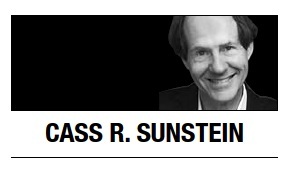
On the U.S. Supreme Court, both conservatives and liberals admire bold, heroic figures, invoking the U.S. Constitution to strike down what they dislike most — whether it’s Obamacare, affirmative action programs, restrictions on abortion, bans on same-sex marriage or executive actions by Democratic or Republican presidents. But the U.S. has had enough of judicial heroism. As the nation debates the future membership and direction of the court, it‘s a good time for minimalists, who speak softly and carry a small stick.
Minimalist judging is not the stuff of newspaper headlines, but it has strong roots. In American history, Justices Felix Frankfurter and Sandra Day O’Connor defined judicial minimalism. They believed in narrow rulings, focused on the facts of particular cases. In Frankfurter’s never-to-be-forgotten words: “Rigorous adherence to the narrow scope of the judicial function is especially demanded in controversies that arouse appeals to the Constitution.”
Warning about the risks of sweeping decisions about the legal authority of the president, Frankfurter wanted the Supreme Court to ask whether particular actions, by particular presidents, transgressed constitutional limitations. Instead of pronouncing broadly and in the abstract about affirmative action programs, O’Connor wanted to answer specific questions about the purposes and effects of concrete programs.
Minimalists reject the idea that judges should adopt deep theories about the real meaning of ideals like liberty or equality. They prefer modest rulings that can be accepted by judges (and Americans) who disagree about a great deal.
In some of its most important decisions, the court has rejected minimalism. Like it or hate it, Roe v. Wade, protecting women’s right to choose abortion, was an iconic heroic ruling. The same is true for Citizens United, broadly protecting the right of corporations to spend money on political campaigns. Minimalists abhor both decisions on the ground that they were unnecessarily wide-ranging — and arrogant.
Some justices are neither heroes nor minimalists. Instead they are soldiers, insisting that judges should follow orders, and thus uphold most of what emerges from the democratic process. Of course, soldiers don’t think that anything goes. But whenever the Constitution is ambiguous, they would give political majorities the benefit of the doubt. Their creed is one of judicial restraint.
Soldiers have no problem with gun control laws, Obamacare, restrictions on abortion, affirmative action or bans on same-sex marriage. Justice Oliver Wendell Holmes was the great judicial soldier, urging, “If the people want to go to Hell I’ll help them. It’s my job.”
In the 1930s, when conservative justices threatened the New Deal, many liberals argued that they should back off and embrace soldiering. In the 1960s, when liberal justices were in the ascendancy, many conservatives lionized Holmes. Whenever the democratic process is with you, and the court’s majority is against you, judicial soldiering starts to look pretty attractive.
Minimalists sound a bit like soldiers, but they’re a different breed. They like case-by-case rulings, not across-the-board restraint. They want to hew closely to precedents and to take problems as they arise. They don’t want to help the people to go to hell. In constitutional law, minimalists think that soldiering is an abdication of the judge’s responsibility.
When, as now, a nation is intensely polarized, the argument for judicial minimalism is unusually strong. Minimalists know that there is a lot that judges do not know — about the trade-off between national security and privacy, about immigration, about affirmative action programs, about the social consequences of new technologies. Aware of their incomplete information, they prefer to focus on the facts of particular cases.
Minimalists are also aware that when citizens feel strongly, an aggressive judicial role, decisively choosing one side over another, might damage democracy itself. They favor rulings that can attract support, or at least respect, from people who disagree on fundamental matters. Modest rulings have the great advantage of telling the current losers (on, say, abortion or gun control) that while a particular day has gone badly, there are other battles to be fought and possibly won.
Justice Antonin Scalia was a great figure, but no one would accuse him of being a minimalist. He favored big rulings — eliminating affirmative action programs, striking down Obamacare and campaign finance laws, insisting that the Constitution has nothing to say about discrimination on the basis of sexual orientation. In that respect, he belongs in the same category as the court’s other heroes, including such liberals as Earl Warren, William Brennan and Thurgood Marshall.
Minimalists are not glamorous figures. Their defining virtue is humility, and they don’t like revolutions. Their paths are slow and steady; their decisions have deep roots. In this moment of division, minimalists are right on a key point: From the highest court in the land, silence is often golden.
By: Cass R. Sunstein
Cass R. Sunstein, the former administrator of the White House Office of Information and Regulatory Affairs, is the Robert Walmsley university professor at Harvard Law School and a Bloomberg View columnist. — Ed.

